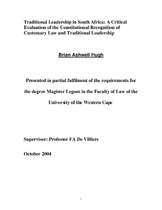| dc.contributor.advisor | De Villiers, F A | |
| dc.contributor.author | Hugh, Brian Ashwell | |
| dc.contributor.other | | |
| dc.contributor.other | Faculty of Law | |
| dc.date.accessioned | 2013-06-19T13:25:51Z | |
| dc.date.available | 2007/03/30 08:45 | |
| dc.date.available | 2007/03/30 | |
| dc.date.available | 2013-06-19T13:25:51Z | |
| dc.date.issued | 2004 | |
| dc.identifier.uri | http://hdl.handle.net/11394/1498 | |
| dc.description | Magister Legum - LLM | en_US |
| dc.description.abstract | The main objectives of this study were to identify the role that customary law and traditional leadership can play, without compromising their current positions or future recognition through legislation, in creating a better life for their constituents. The study analysed diverse issues such as legislative reform, the future role and functions of traditional leaders, training needs of traditional leaders, and the impact of a possible lack of commitment by national and provincial government on the training of traditional leaders to fulfill their functions within the ambit of the Constitution. | en_US |
| dc.language.iso | en | en_US |
| dc.publisher | University of the Western Cape | en_US |
| dc.subject | Law | en_US |
| dc.subject | Primitive | en_US |
| dc.subject | South Africa | en_US |
| dc.subject | Ethnological jurisprudence | en_US |
| dc.subject | Indigenous peoples | en_US |
| dc.subject | Legal status | en_US |
| dc.title | Traditional leadership in South Africa: a critical evaluation of the constitutional recognition of customary law and traditional leadership | en_US |
| dc.type | Thesis | en_US |
| dc.rights.holder | University of the Western Cape | en_US |
| dc.description.country | South Africa | |

